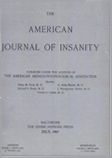SOME OBSERVATIONS ON THE RELATIONSHIP BETWEEN SYPHILIS OF THE NERVOUS SYSTEM AND THE PSYCHOSES
Abstract
1. Of about 2500 cases examined in the last three years, II are sufficiently unusual to be reported on.
2. Of these, four had clinical pictures of dementia præcox; one of constitutional inferiority, and one imbecility; two organic and three paresis.
3. In two cases of dementia præcox, the serology of neurosyphilis was found early. In the other two, only after many years. In all four it was not expected. One case has tabetic symptoms, the others no symptoms of neurosyphilis. The case with tabetic symptoms also exhibits catatomic symptoms.
4. These are the only cases of dementia præecox in the hospital showing such serology, though other cases have positive blood tests.
5. One "hysterical" or "constitutionally inferior" person developed secondary syphilis five years before death. A year before death, the serology of neurosyphilis was demonstrated. Autopsy confirmed this. No clinical symptoms.
6. An "imbecile" developed genuine paresis in the hospital. Autopsy and serologytypical.
7. An "organic" case without signs of paresis gives the serology of it.
8. A case, clinically Huntington's Chorea, gives the serology of paresis, without clinical signs of it.
9. One case, clinically paresis at first, seems now like dementia præcox. Serology positive.
10. One case, clinically paresis, has run an extremely long, stationary course. Wassermann negative in blood and fluid; other tests positive.
II. One case, clinically and serologically paresis, has as his most prominent symptom, and the only one at the present time, auditory hallucinations.
12. We have to do with (a) neurosyphilis in unusual causal relationships, or (b) coincident psychoses and symptomless neurosyphilis.
13. Diagnoses should be based on both clinical and laboratory findings. The neglect of either may lead to improper results.
Access content
To read the fulltext, please use one of the options below to sign in or purchase access.- Personal login
- Institutional Login
- Sign in via OpenAthens
- Register for access
-
Please login/register if you wish to pair your device and check access availability.
Not a subscriber?
PsychiatryOnline subscription options offer access to the DSM-5 library, books, journals, CME, and patient resources. This all-in-one virtual library provides psychiatrists and mental health professionals with key resources for diagnosis, treatment, research, and professional development.
Need more help? PsychiatryOnline Customer Service may be reached by emailing [email protected] or by calling 800-368-5777 (in the U.S.) or 703-907-7322 (outside the U.S.).



